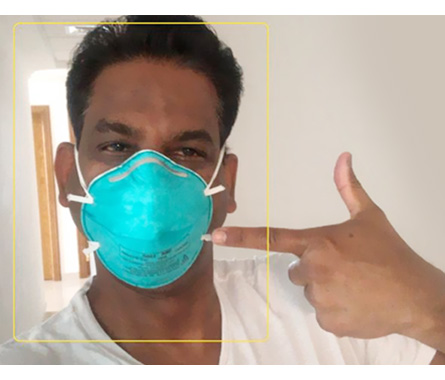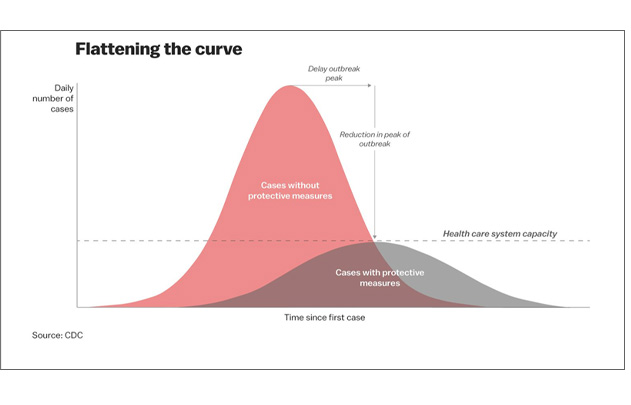MaskUp and beat COVID-19 pandemic
Dr Ricardo Persaud
BTEC HNC, MB BS (Lond), MPHIL, MSB, CBIOL, DOHNS, MRCS (Gen Surg), FRCS (ORL-HNS), CCT (Otol) (UK)

The universal use of face masks in the fight against COVID-19 pandemic is controversial. The World Health Organisation (WHO) states that individuals should ‘only wear a mask if you are ill with COVID-19 symptoms (especially coughing) or looking after someone who may have COVID-19. If you are not ill or looking after someone who is ill then you are wasting a mask’. Furthermore, ‘WHO advises rational use of medical masks to avoid unnecessary wastage of precious resources and mis-use of masks.’ In light of our recent understanding of the modes of transmission of COVID-19, we would like to challenge WHO notions and recommend masks for everyone in order to ‘flatten’ the epidemiological curve (Figure 1) and release the pause button on the world economy.

COVID-19 is a highly contagious disease transmitted from humans to humans by sneezing, coughing and talking. These activities release respiratory droplets, which are the main agents of transmission. An intrinsic method of transmission involving hand to mouth and/or nose contact has also been proposed. All of these transmission mechanisms can be blocked, either fully or partially. by wearing a face mask which acts as a passive source control measure. Such reduction in transmission, coupled with 1 meter social distancing and proper hand hygiene, would inevitably flatten the curve. The evidence to support our claim can be found in the Czech Republic, where it is mandatory for the whole population to wear masks – either commercial or homemade. This mandate resulted in the healthcare system being able to cope with the trickle of positive cases as well as the absence of lockdown periods. The same is true for other countries such as Singapore, Hong Kong, Japan and South Korea. In contrast, the countries where face masks are not compulsory, for example, UK, Spain, Italy and France, the COVID-19 pandemic is most pronounced.
There are different types of face masks; the N95 and FFP, if size fitted, are promoted as having the ability to prevent the wearer from inhaling 95% of infective respiratory droplets upon exposure (meaning that there is still a 5% risk). These work better if they are properly fitted to size and are Vaseline sealed. They are promoted for use by health care workers exposed to infective patients. Limitations in access to these masks include cost and availability due to the high demand.
The surgical face mask, on the other hand, commonly coloured green or blue, were originally produced to prevent surgeons from infecting patients with nasal or oral secretions during surgery.
Lastly, the homemade face mask which can be easily made at home are 3 times less efficient than the surgical mask in its simplest design, but still remain useful in trapping some expelled droplets from an infected COVID-19 patient who is coughing, sneezing or speaking. We propose to improve the design of this simple homemade face mask, by introducing an inner layer of cotton which will absorb oro-nasal secretions better and increase the current surface area by 100% to improve coverage, fit and performance.
It is importance to highlight that current evidence suggests that ≥ 50% of COVID-19 patients may be asymptomatic, but still possess the ability to transmit the virus while coughing sneezing or speaking to uninfected people, through release of droplets.
We thus propose that:
- Country wide measures should be taken to promote the production of homemade face masks with modifications as specified above (inner layer of cotton and doubling of the surface layer of the mask to improve its ability to trap respiratory droplets).
- The public are encouraged to make their own masks and further spread awareness for mandatory mask use by all global citizens (except health workers at risk who will require N95 or FFP grade face masks).
- Homemade face mask will be reusable and will save massive foreign exchange spent on importing face masks whilst serving to diffuse anxiety and pressure.
We estimate that because this modified homemade face mask can trap up to 80% of infective respiratory droplets, populations could achieve some level of infection source control by utilizing them. The new infection rate will drop significantly if this nation-wide face mask use policy is implemented immediately. We can also extrapolate that given a potential reduction in new infection if this measure is implemented, the case rate will drop, the epidemiological peak will also drop, flattening the curve appreciably. This will translate to fewer patients at any point in time and will effectively mean that even weak health systems in the developing world will be able to handle lower trickles of patients (Fig 1).
We strongly believe that all governments, as a matter of urgency, should enact a law that mandatorily affirms the use of face masks outdoors and in workplaces. Governments also need to encourage all to contribute to a face mask bank or channel a fraction of donations by well-meaning citizens for the massive production and distribution of these reusable modified homemade face masks. Lastly, the development and sharing of guidelines or educative materials on how to care for these face mask (like washing them every night, drying overnight for reuse the next day, and hand hygiene before removing or putting them on) needs to be disseminated to global populations.
These propositions alongside social distancing and hand hygiene measures will no doubt work synergistically and prevent the need for lockdown to control COVID-19 pandemic.
In conclusion, despite being ardent proponents of strict adherence to WHO guidelines, which only recently argued against masks for everyone, we are constrained to break ranks on this occasion after having reviewed several materials and rigorously evaluating our position. We are confident that if we were to promote this simple measure, we would have done a lot to arrest this epidemic and may even be able to remove movement restrictions and get our economy back on track in these perilous times. We sincerely hope that WHO and other governments would revisit this issue immediately and endorse the use of face masks for everyone in workplaces and outdoors.
20,896
Happy Patients
2836
Successful Cases
50
Students
